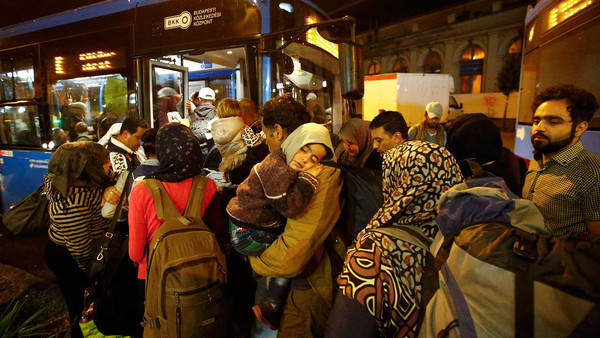The deadly disunity of the Europeans
Wolfgang Münchau
A quota system is too crude and politically as unsustainable as fiscal transfers among countries
Europe’s multiple crises share a common theme. Whether we are talking about banks, sovereign debt or, as now is the case, refugees, the EU finds it hard to act. What we have is a classic collective action problem, of the kind described by Mancur Olson, the political economist, in the 1960s. People have a common interest in acting but fail to do so because vested interests get in the way. Even the harrowing pictures of the dead young boy will not resolve the collective action problem. All it will do is to produce visible hyperactivity.
The three crises share another common theme: each one of them is virtually intractable if you look at it from a micro perspective, from the vantage point of a Greek bank or Budapest East train station. But if you look at immigration from an EU-level perspective, the picture is much more nuanced.
The EU has 500m inhabitants. Setting aside refugees, net immigration — the difference between those coming into and those leaving the EU — was 539,000 in 2013, about 0.1 per cent of the total population. Net immigration was higher in 2010, when it stood at 750,000.
The UN refugee agency (UNHCR) puts the number of refugees and migrants who crossed the Mediterranean at 300,000 between January and August, compared with 219,000 for the whole of 2014. If you extrapolate this year’s number to the whole of 2015, you get to around 450,000, an extra 230,000 people compared with last year.
Its solution would be straightforward in the presence of a central authority empowered to take decisions. But this is not how the EU works. It works through co-ordination and harmonisation — through fiscal rules, banking regulation and neighbourhood policies. But none of them prevented the crisis, and none of them helps solve it. The problem was never a lack of rules or policies. It was the simple fact that certain things in life cannot just be co-ordinated.
Nor are member states big enough to act on their own — not even Germany. Angela Merkel is, for once, on the right side of the argument. But Germany does not have the capacity to absorb all the EU immigrants. Viktor Orban, Hungary’s populist prime minister, produced a good rendition of the mindset that gives rise to collective action problems. He said last week this was not a European crisis, but a German crisis, since all the refugees wanted to go to Germany.
Germany, I would add, acted in a similarly cavalier fashion during the eurozone crises.
The collective action problem is nobody’s fault in particular. It is hard-wired into the system. The EU’s job is not to prevent financial crises, or to save children from drowning in the Mediterranean Sea. Its job is to run market integration programmes, or negotiate complicated trade agreements.
When there is a crisis outside its narrow reservation, its instinct is to forge a political compromise. This is how we ended up with the rescue umbrella for the eurozone, and an ineffective bank resolution regime. The proposed quota system for immigrants is drawn up in the same spirit.
Angel Ubide from the Peterson Institution in Washington attributes the failure of the eurozone’s banking union to a primacy of co-ordination over mutualisation. I think this gets to the core of the problem. Instead of mutualising, or sharing, risks, EU member states only share procedures and follow common rules. But the risks remain within member states. There are many areas where this approach is pragmatic and sensible. A sudden spike in immigration is not one of them. A quota system is far too crude, and politically as unsustainable as fiscal transfers between countries. Such policies breed resentment, and ultimately fail. In a quota system you do not kick cans down the road, but people.
The real alternative, in the long run, is not between co-ordination and mutualisation, but between separation and mutualisation. Those who support further European integration will be in a position to make a powerful argument that only the EU is in a position to solve the crises. The debate will not be about a transfer of power from the capitals to Brussels. It will be about whether we empower the EU with tasks that nobody else can handle and whether we give it the necessary financial resources.
I fear this is not going to happen for a long time — for two reasons. The less important one is that the likes of Mr Orban will be among those to take the decision. The deeper reason is that Europeans are not yet desperate enough to accept the Logic of Collective Action, the title of Olson’s 1965 book.

0 comments:
Publicar un comentario